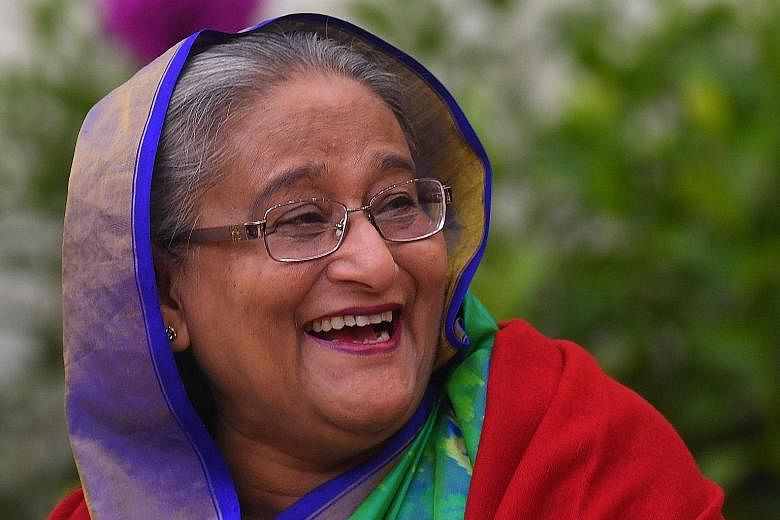DHAKA • Ms Sheikh Hasina was sworn in as Bangladesh's Prime Minister for a record fourth term yesterday after a crushing election victory marred by deadly violence and claims of widespread rigging.
Ms Hasina, 71, has presided over record economic growth in the South Asian country of 165 million people but critics have accused her of creeping authoritarianism.
Her ruling Awami League party and its allies won the Dec 30 elections by a landslide, securing 288 seats in the 300-seat Parliament compared with just seven for the main opposition.
The campaign saw mass arrests of opposition activists and candidates, and allegations of widespread rigging, including ballot stuffing and voter intimidation. Seventeen people were killed on election day.
The European Union has called for a probe into allegations of irregularities, while the United Nations last Friday said there were indications that "reprisals" have targeted the opposition since the election, including physical attacks, arbitrary arrests, harassment, disappearances and filing of criminal cases.
The opposition, which last week boycotted the oath-taking ceremony of the newly elected MPs, has demanded fresh polls under a neutral caretaker government - something Ms Hasina and the election commission have rejected outright.
President Abdul Hamid administered Ms Hasina's oath in a ceremony at the presidential palace Bangabhaban. A 47-member Cabinet with many new faces was also sworn in.
To her supporters, Ms Hasina is known as Bangladesh's "mother of humanity" for allowing in hundreds of thousands of Rohingya refugees fleeing a military crackdown in neighbouring Myanmar in 2017.
Opponents accuse her of jailing archfoe Khaleda Zia on politically motivated charges, of orchestrating mass arrests, enforced disappearances and passing draconian anti-press freedom laws to try to cling to power.
Ms Hasina was abroad in August 1975 when a group of renegade military officers assassinated her father, Bangladesh's first president, Mr Sheikh Mujibur Rahman.
She returned from exile in 1981 to take over as Awami League leader, later joining forces with Ms Zia's Bangladesh Nationalist Party to help oust military dictator Hussain Muhammad Ershad in 1990.
But the pair soon fell out and their rivalry has dominated Bangladeshi politics for the last 30 years.
Ms Hasina was first elected prime minister in 1996 but she struggled to emerge from the shadow of her father during her first term and lost the 2001 contest.
She returned to power after winning the December 2008 polls by a landslide, just months after she was imprisoned by a military-backed government on corruption charges.
She has been in power ever since, presiding over economic expansion of more than 6 per cent every year since 2009. Gross domestic product growth last year was 7.86 per cent and Ms Hasina has promised to take that into double digits.
AGENCE FRANCE-PRESSE

